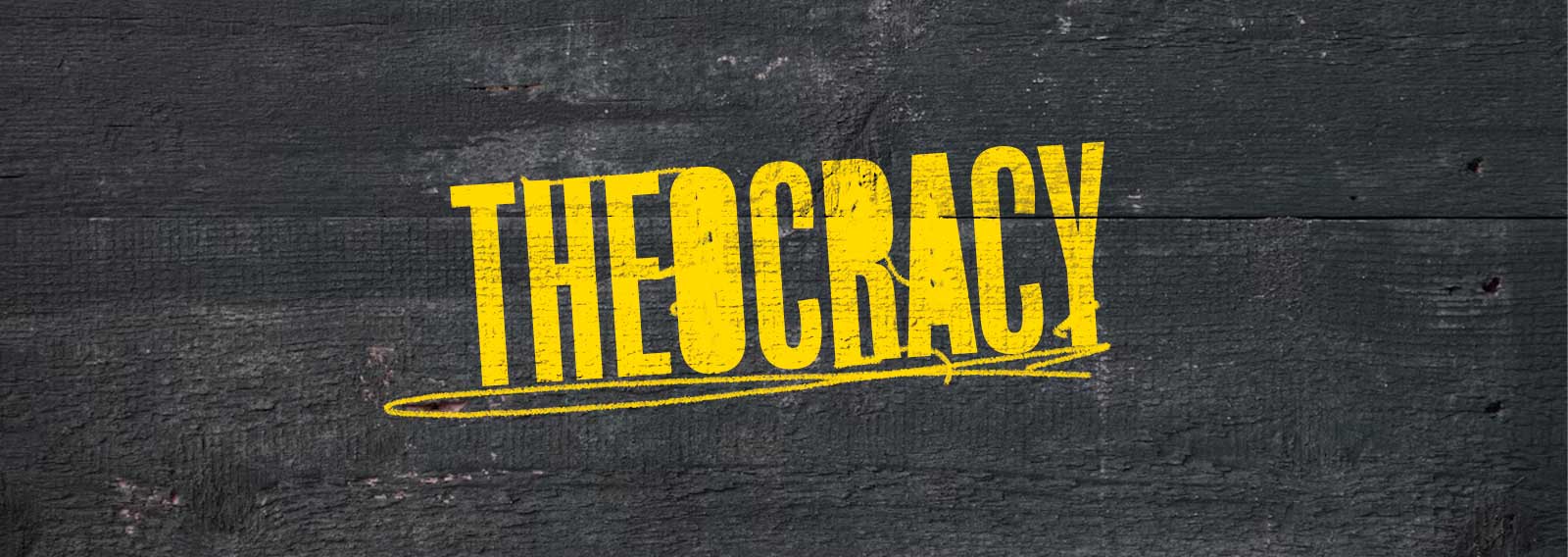God rules. God reigns. God is Lord over all. He is the eternal king. If affirming these realities makes me a theocrat, then so be it!
One contemporary worship song, Ancient of Days, nicely encapsulates some of these wonderful and marvellous biblical truths, based on texts such as Psalm 2, Philippians 2, and Revelation 22:
Blessing and honor, glory and power
Be unto the Ancient of Days
From every nation, all of creation
Bow before the Ancient of Days
Every tongue in heaven and earth
Shall declare Your glory
Every knee shall bow at
Your throne in worship
You will be exalted, oh God
And Your kingdom shall not pass away
Oh, Ancient of Days
Your kingdom shall reign over all the earth
Sing unto the Ancient of Days
For none can compare to Your matchless worth
Sing unto the Ancient of Days
See the Ron Kenoly rendition of this song here:
There is plenty of debate on things like theocracy, theonomy, church-state relations, and related beliefs. I have written on these matters many times before, but here I want to draw upon two Christian thinkers, both within the Reformed camp, but with some obvious differences. Both have repeatedly spoken to the reality of the Lordship of Christ over all of life.
Richard Mouw
The first is Richard Mouw, the former president of Fuller Theological Seminary who is now at Calvin University in Grand Rapids, Michigan. I have discussed him and his work often on these pages. He just recently wrote a piece called “Theocracy Is Not the Enemy of Pluralism.” It has this as a subtitle: “God’s rule is inherently true and doesn’t require that we force it on anyone.”
He began this way:
A liberal acquaintance told me recently that while he generally dislikes evangelicals, he doesn’t find me to be as bad as the rest: “At least you don’t rant about wanting to establish a theocracy!” I decided to accept what he said as a compliment, even though I regretted not coming clean with him about theocracy.
Truth be told, my wife and I do belong to a pro-theocracy organization. Indeed, we attend its meetings every week. In those gatherings, we learn about what it means to support a theocracy, and we sing songs that are meant to strengthen our theocratic commitments. The organization I am referring to, of course, is our local church.
Theocracy literally means “the rule of God,” and Christians believe that while our churches do have human leaders, those leaders know that they are directly accountable to God for what they think and do. They keep reminding us that we Christians belong to “the kingdom of God,” which means that our ultimate allegiance is to Jesus, whom we often refer to as “ruling” over us.
The idea of the church as a theocracy, however, is part of a much larger theocratic picture. The universe itself in all its complex glory is a theocracy. The Jewish community’s shabbat prayer captures well the Bible’s theocratic perspective when it begins with “Blessed are you, Lord our God, King of the universe.”
Everything that exists is under God’s rule. It is this theocratic arrangement—defining the very nature of reality—that gives believers meaning and hope in our lives. But does that mean that believers like me should try to turn the United States into a theocracy? I think not. God does not want me to force my theocratic understanding of reality on others. What God wants from people is that they freely offer their obedience to his will.
Mouw looks at some options as to how evangelicals might engage with the surrounding culture, and then finishes with these words:
One of my heroes in the faith, the great Dutch statesman Abraham Kuyper, proclaimed in his inaugural address at the university he founded, “There is not a square inch in the whole domain of our human existence over which Christ, who is Sovereign over all, does not cry: ‘Mine!’”
I find that inspiring manifesto to be a motivation for how I am to live as a theocrat in contemporary life. There is always a temptation, of course, for us to answer that rallying cry in an arrogant and imperialistic manner—as if all we have to do is go out there and grab hold of all those square inches in the name of Jesus.
Properly understood, theocracy requires a humble spirit. The apostle Peter tells us that when we are challenged “to give the reason for the hope” we have in Christ, we must take care to “do this with gentleness and respect” (1 Pet. 3:15). Since Jesus claims every square inch of creation as his own, wherever we go in our lives, we are standing on sacred ground.
In my evangelical youth, I was taught Hudson Taylor’s famous saying “Christ is either Lord of all, or is not Lord at all.” I keep learning more about what it means to represent the cause of the gospel in a gentle and respectful manner.
The God whose majesty we theocrats worship in church not only sends us out into the world over which he rules but also assures us that, wherever we go, he will be with us.
He invites us to join him on those square inches that are occupied by precious human beings who suffer from the pain of abuse, grief, loneliness and the hopelessness that comes from unbelief.
We live in times when our fellow human beings desperately need to encounter evangelicals for whom being theocratic means actively serving the cause of a loving Savior.
Douglas Wilson
The second Christian that I have often appealed to might be a bit feistier in some ways than Mouw, but he would share many beliefs in common with him. Like Mouw, Wilson reminds us that some form of theocracy is inevitable. In 2007 for example he wrote a piece entitled “Who’s Theo?” He was responding to one Christian writer who said he didn’t want to live in a theocracy. Here is one key paragraph from that article in which he seeks to reply to that objection:
But if we are talking about lifestyle, and if lifestyle refers to something more than a personal consumption item, at some point we are going to have to enact laws. Culture is impossible without them. But cultures differ because they serve different gods, and different gods require different things. This means the laws are different. Every society is a theocracy. The only question is, “Who’s Theo?”
Another article of his that is worth quoting from is his 2018 piece, “A Primer on Theocracies”. This too is a response to a well-known evangelical leader who had written on theocracy and related issues. Said Wilson:
First, theocracy is inescapable. Every society is theocratic, every society has a god of the system. The ethical expectations governing the members of that society are generated by the god of the system, and dissenters are clubbed in accordance with the divine will. In Islamic republics, this god is Allah, in secular democracies it is Demos, in Alabama it is Football. There is no such thing as a society with the great god Vacuum at the top. Any society that had no arche to hold it together would—for that reason—not hold together. Every society has an ultimate point of cohesion, and that point of cohesion, whatever it is, necessarily has religious value.
Second, working the other way, every social value has to be grounded (or not), justified (or not), in a worldview. If Christians commend a certain course of action to the larger society, and that larger society stares back at us and asks why, what do we say in response? All the ultimate ethical answers to questions that a society faces are answers that have to answer the two basic worldview questions—why? and who says? Societies don’t get to say, “just because.”
He offers two further responses, and then finishes with these words:
Respect for individual conscience is itself a religious value. Some religions respect it, but many do not. Let us say that we have successfully repudiated any attempt to appeal to the will of any God as we make our decisions as a society. If that is the case, then why should we respect individual conscience? Why is religious liberty valuable or important? It is certainly important in Christian theology, but we have agreed not to drag that in. Why don’t we just tell the Little Sisters of the Poor that we have collectively decided that it’s high time they made their peace with contraception and abortion coverage? We cannot allow their imperious and theocratic tendencies to skew our secular ideals of acceptable insurance coverage. Who do they think they are?
[Moore says:] “Theocracies are terrible, because the god behind them is the root of all the horrors of the present age: a depraved humanity pretending to be divine.”
What is actually terrible is confused thinking about theocracies. Look carefully at what Moore says here — “the god behind them.” But all governments have a god behind them. All governments rest upon some ultimate authority. That ultimate authority will either be the true and living God or that authority will be an idol. We must reject the idolatrous option out of hand, for we are Christians.
But when we have acknowledged the true and living God, as we must do, we are not yet home free. As Moore points out, terrible things can be done in the name of the true religion. In fact, the true religion did the very worst thing that has ever been done by any human governing authority, and that was the crucifixion of the Son of God.
So yes, theocracies can do awful things. The solution is for prophets to confront them with an open Bible. The solution is not for prophets to tell the godless authorities that they may (or must) throw all the Bibles away, and govern us according to their own mendacious lusts. It may be just me, but I can see that going wrong somehow.
The two writers I have cited here would differ on a number of details, but both would affirm the lyrics that I started my article with and the Scriptures that undergird them. Let me finish by presenting all of Psalm 2:
Why do the nations rage
and the peoples plot in vain?
The kings of the earth set themselves,
and the rulers take counsel together,
against the Lord and against his Anointed, saying,
“Let us burst their bonds apart
and cast away their cords from us.”He who sits in the heavens laughs;
the Lord holds them in derision.
Then he will speak to them in his wrath,
and terrify them in his fury, saying,
“As for me, I have set my King
on Zion, my holy hill.”I will tell of the decree:
The Lord said to me, “You are my Son;
today I have begotten you.
Ask of me, and I will make the nations your heritage,
and the ends of the earth your possession.
You shall break them with a rod of iron
and dash them in pieces like a potter’s vessel.”Now therefore, O kings, be wise;
be warned, O rulers of the earth.
Serve the Lord with fear,
and rejoice with trembling.
Kiss the Son,
lest he be angry, and you perish in the way,
for his wrath is quickly kindled.
Blessed are all who take refuge in him.

















